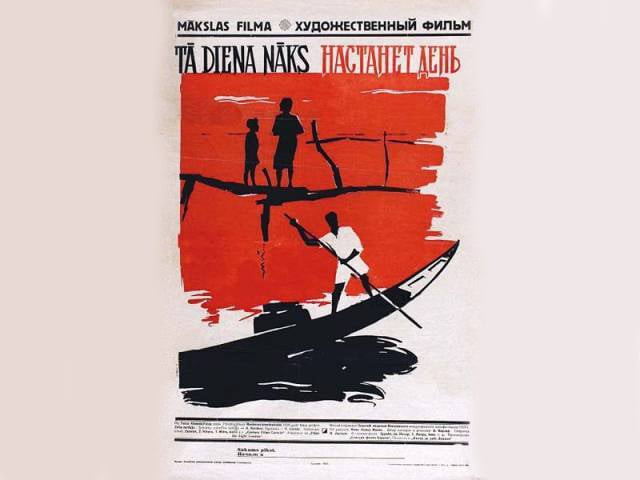Pakistan’s first Oscar submission ‘Jago Hua Savera’ goes to Cannes
This is the first time a Pakistani film has been inducted in Cannes Classics

Poster made for the film’s USSR release. PHOTO COURTESY: MPAOP
Over 55 years after it became the newly-formed Pakistan’s first Oscar submission, AJ Kardar’s Jago Hua Savera (Day Shall Dawn) has been selected for screening at the prestigious Festival de Cannes 2016.
Part of the non-competitive Cannes Classics programme, Jago Hua Savera will join a line-up that also includes films made by Marlon Brando, Andreï Tarkovski and Jean-Luc Godard.
'The Assassin' wins big at Asian Film Awards

Talking to The Express Tribune, an official at the Festival de Cannes confirmed that this is the first time a Pakistani film has been inducted in Cannes Classics. Requesting anonymity, he said, “Cannes Classics is a section of the Festival de Cannes dedicated to restored prints, documentaries about cinema, tributes and cinema materclasses.” When asked on what basis was Jago Hua Savera shortlisted, he added, “We never comment on the selection. The fact that the film has been selected speaks for itself. We receive submissions from all over the world; films belonging to the history of cinema and those that have been technically restored.”
Back from the dead
The film’s original negatives were all lost and the restoration was carried out through various rolls of 35mm black and white prints. This tedious task was taken up by the progeny of Nauman Taseer, the late producer of the film. His son Anjum Taseer explained the restoration process, “The element was carefully scanned. Pre-grading on Nucoda optimised the tone scale followed by semi-automated passes through Phoenix for stabilisation and removal of defects. Extensive manual cleaning, using MTI Nova, Diamant and Phoenix softwares, restored the images as closely as possible to their original projection screening. A DI theatre fine grade followed.”
Irish-Pakistani film to be screened at Cannes

Stills from the movie. PHOTO COURTESY: ANJUM TASEER
He said the entire cast and crew of Jago Hua Savera comprised first-timers and Bengali star Tripti Mitra was the only actor of renown. “It is a great honour for Pakistan that Jago Hua Savera was chosen … it is one of these rare gems from the past; perhaps the only Pakistani film to win so many international awards,” Anjum wrote in an email.
The restored version has previously been screened at the New York Film Festival 2008 and the Three Continents Festival 2007.
Plight of the fisherfolk
The 50s were quite a time for cinema in the region. While the Satyajit Rays were wreaking havoc in Calcutta, the Guru Dutts in Bombay were belting out hits, one after another.
In Pakistan, like everything else, film production too was not in the best of conditions. One of the first Dhaka Studio productions, Jago Hua Savera was shot in three-and-a-half months at the fishing village of Shaitnol near the capital of present day Bangladesh. Filming equipment was ordered from the UK and US and taken to the location via river transport. Most of the crew members had flown in from abroad, including the Oscar-winning cinematographer Walter Lassally.
Jago Hua Savera tells the story of a fisherman who wants to one day own a boat of his own. In the backdrop of extreme poverty, he battles both the exploitation of the local moneylender and death.
In his essay Modernism and Film in South Asia, Rahul Sapra calls it the first realistic and experimental movie of Pakistan. “Jago Hua Savera was an exception, since the genre of melodrama, influenced by mainstream Indian cinema, continued to dominate Pakistani cinema,” he writes.

PHOTO COURTESY: ANJUM TASEER
Amongst other accolades, the film won a gold medal at the inaugural Moscow International Film Festival in 1959. Linking it to the coming closer of Pakistan and the then USSR, Hafeez-ur-Rehman Khan in Pakistan’s Relations with the U.S.S.R calls the win “progress in cultural field”.
Faiz the screenwriter
How Faiz Ahmed Faiz got involved in the film merits a discussion on its own. In the recently published Love and Revolution: Faiz Ahmed Faiz – The Authorised Biography, Ali Madeeh Hashmi notes that after getting released from prison, Faiz had gained immense popularity. “In Pakistan, he was welcomed back from prison a hero. It was during this time that he met AJ Kardar, son of the famed film-maker AR Kardar, who was originally from Lahore and had been one of the pioneers of the film industry there.”
It didn’t take long for Kardar junior to convince the poet. “AJ Kardar persuaded Faiz to write a film script which Faiz based on one of his favourite novels, The Boatman of the Padma [a translation of Manik Bandhopadhyay’s classic, Padma Nadir Manjhi], about the lives of Bengali fishermen.”

Faiz on the film set. PHOTO COURTESY: MPAOP
In Faiz’s Letters to Alys, Salima Hashmi quotes an excerpt from her father’s letter to her mother during the time when he was writing the film. “In the last three days there has been no sun, the trees are dark with rain and the wind feels heavy with nostalgic regrets. My window brings memories of Simla and Kashmir and in the midst of work and discussions there are sudden stabs of homesickness and thoughts of you and the urge to drop everything and return. I could work so much better if you were here, but it can’t be helped so I’m trying to rush through it as speedily as I can.”
While the film owes greatly to its association with the larger-than-life figure that Faiz was, Bangladeshi film critic Alamgir Kabir notes, “Despite all its sincerity, Faiz failed to capture in the theme an authentic Bengaliness mainly because he never lived in this part of the country long enough to know its people and the land intimately enough.”
Drawing parallels between the film’s opening sequence and Luchino Visconti’s La Terra Trema, he wrote that the film offered a visual novelty for the foreigners but meant little for the East Pakistanis.
According to Pakistan Film Magazine, Jago Hua Savera was a commercial failure and was taken down from Karachi’s Jubliee Cinema (now Jubliee Centre) in just three days.
Tracing the reasons behind the film’s box office failure, Kabir says Jago Hua Savera could not be “understood by ordinary spectators as the language used in the film was a peculiar mixture of Bengali and Urdu easily understandable to neither community”. However, to him, the film remains the only example of efficient film-making in Pakistan.
In an interview with Ahmad Salim of the now-defunct Viewpoint, Faiz himself shed light on the film’s failure. “All right so you produce an ideological film like, for instance, Jago Hua Savera. Suppose it is ready for screening. But imagine the gatekeepers between the studio and cinema-screen do not share your ideology. They may not be concerned about its ideological point of view or its aesthetic aspect. As a result, it will not reach the audiences,” he said. Voicing another view that film puritans of today still hold, Faiz said, “It is a misconception that anything that has social perspective, or which has high aesthetic or technical standards will not be appreciated by the people.”
Inaugurated in 2004, Cannes Classics is a permanent fixture at the annual event that aims to celebrate film history. The festival will be held from May 11 to May 22 this year and will be attended by the families of both Nauman and Faiz.
Published in The Express Tribune, May 2nd, 2016.
Like Life & Style on Facebook, follow @ETLifeandStyle on Twitter for the latest in fashion, gossip and entertainment.



















COMMENTS
Comments are moderated and generally will be posted if they are on-topic and not abusive.
For more information, please see our Comments FAQ